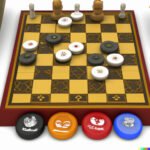Classic board game names like Monopoly, Scrabble, and Chess hold a special place in the hearts of game enthusiasts and casual players alike. These iconic games have stood the test of time and continue to be enjoyed by people of all ages. In this section, we will delve into the history behind these classic board games, exploring their origins and enduring appeal.
The origins of popular board games such as Monopoly, Scrabble, and Chess are steeped in history, with each game bearing its own unique story of creation and evolution. Understanding the roots of these beloved games provides insight into their cultural significance and lasting impact on society. By exploring the historical background of classic board game names, we gain a deeper appreciation for the timeless entertainment they offer.
From ancient civilizations to modern-day innovations, board games have continuously evolved alongside human culture and technology. The development of classic board game names reflects broader societal changes and trends throughout history. By examining how these games have adapted over time, we can better appreciate their enduring relevance and the nostalgia they evoke in our modern world.
Iconic Game Titles
The classic board game industry has produced some iconic game titles that have become synonymous with family fun and friendly competition. From the whimsical Candy Land to the mysterious Clue and the strategic Risk, these classic board game names have endured through generations, captivating players of all ages. Let’s take a closer look at these timeless titles and their lasting impact on the world of gaming.
Some of the most beloved classic board game names include:
- Candy Land: This colorful and enchanting game takes players on a journey through a land of sweet treats and sugary delights. With its simple gameplay and vibrant design, Candy Land has secured its place as a cherished classic among children and families.
- Clue: Known as Cluedo in some regions, this murder mystery game challenges players to solve a crime by deducing the culprit, weapon, and location of the fictional murder. With its intriguing premise and engaging mechanics, Clue has remained a staple in the world of board games since its debut in the 1940s.
- Risk: A strategic conquest game that tests players’ ability to expand their empires and conquer territories, Risk has been a go-to choice for those seeking intense gameplay and geopolitical maneuvering. Its enduring popularity has cemented it as one of the most iconic classic board game names in history.
These classic board game names have not only entertained countless individuals over the years but have also become symbols of nostalgia and cultural significance. Whether it’s navigating through Candy Land’s sugary landscapes, unraveling mysteries in Clue’s grand mansion, or engaging in global warfare in Risk, these timeless titles continue to captivate audiences with their enduring appeal.
Evolution of Board Game Names
Classic board game names have a rich history that has evolved over time. From the traditional and straightforward titles of games like Chess and Checkers to the more whimsical and imaginative names of modern board games, there has been a noticeable shift in how games are named. The evolution of board game names can be attributed to various factors such as changes in marketing strategies, target demographics, and cultural influences.
One notable aspect of the evolution of classic board game names is the impact of branding. Brands like Hasbro and Parker Brothers have become synonymous with iconic games such as Monopoly, Scrabble, and Risk.
These companies have played a significant role in shaping not only the gameplay experience but also the perception of these classic board game names in popular culture. The strategic use of branding has helped these games stand the test of time and remain relevant in an ever-changing market.
In addition to branding, the evolution of board game names has also been influenced by shifts in societal norms and values. Games like Candy Land and Clue reflect the changing attitudes towards entertainment and play, incorporating elements of fantasy and mystery into their titles to appeal to new generations of players. This adaptability in board game naming has allowed classic titles to maintain their appeal while also attracting younger audiences.
| Evolution Factors | Influence |
|---|---|
| Branding | Hasbro & Parker Brothers’ impact on Monopoly, Scrabble, Risk |
| Societal Norms | Cultural shifts reflected in Candy Land and Clue |
Cultural Significance
Classic board game names have not only provided hours of entertainment for families and friends but have also become a significant part of popular culture. From the iconic Monopoly to the strategic Chess, these classic board game names have embedded themselves into society in various ways.
Pop Culture References
Classic board game names have made their way into movies, television shows, and even literature. Characters playing a game of Scrabble or mentioning a round of Clue have become common motifs in storytelling. These references not only add a layer of relatability for audiences but also serve as a nod to the timeless appeal of these games.
Social Impact
Board games like Risk and Candy Land have not only provided entertainment but also brought people together. The interaction and competition fostered by these classic board games have contributed to building social skills, teamwork, and critical thinking among players. Furthermore, board game gatherings have become a popular social activity, creating opportunities for bonding and quality time with loved ones.
Educational Value
The influence of classic board game names goes beyond mere entertainment; they hold educational value as well. Games like Scrabble encourage vocabulary expansion and linguistic skills, while Chess enhances strategic thinking and problem-solving abilities. As such, classic board game names have become an integral part of educational tools and programs aimed at developing important cognitive skills in both younger and older generations.
Nostalgia in Board Game Names
Classic board game names evoke a sense of nostalgia and emotional connection for many individuals. Whether it’s recalling childhood memories spent playing these games with family and friends or simply reminiscing about the simpler times, these classic titles hold a special place in people’s hearts. Some of the most beloved classic board game names include:
- Monopoly
- Scrabble
- Risk
- Candy Land
- Clue
For many, just hearing these names can transport them back to a time when they were carefree and immersed in the joy of playing these timeless games.
The emotional connection to classic board game names is not just limited to personal memories, but also extends to the cultural significance of these games. They have become ingrained in popular culture, making appearances in movies, television shows, and even inspiring various merchandise and adaptations. The enduring appeal of classic board game names has contributed to their iconic status in society, further solidifying their nostalgic value.
Even as modern technology continues to advance and digital gaming takes center stage, there is still a strong demand for traditional board games with classic names. This demonstrates the lasting impact and emotional resonance that these titles have on people across different generations. The nostalgia associated with classic board game names also plays a significant role in driving the continued interest and admiration for these timeless games.
Modern Revival
In recent years, there has been a noticeable revival of classic board game names in the era of digital gaming. Despite the rise of video games and online entertainment, traditional board games like Monopoly, Scrabble, and Chess have maintained their appeal and even experienced a resurgence in popularity. This trend can be attributed to several factors, including a growing appreciation for social interaction, nostalgia for simpler times, and a desire for hands-on gameplay.
Appeal of Traditional Gameplay
One reason for the revival of classic board game names is the appeal of traditional gameplay. In a world dominated by screens and technology, many individuals long for the tactile experience of playing a physical board game.
The act of rolling dice, moving tokens, and interacting with other players face-to-face provides a level of engagement that digital games cannot replicate. Additionally, traditional board games offer a break from the constant stimulation of technology and allow players to enjoy a slower-paced form of entertainment.
Nostalgia for Simpler Times
The resurgence of classic board game names also reflects a collective nostalgia for simpler times. Many adults fondly remember playing these games during their childhood or family gatherings. As such, revisiting these classic titles allows individuals to reconnect with cherished memories and relive moments from their past. For younger generations who may not have grown up with these games, there is an allure in experiencing something that has stood the test of time and holds historical significance in popular culture.
Social Interaction and Bonding
Furthermore, the revival of classic board game names can be attributed to the desire for social interaction and bonding. In an age where communication often occurs through digital platforms, there is immense value placed on face-to-face interactions and quality time spent with loved ones.
Board games provide an opportunity for friends and family members to gather around a table, engage in friendly competition, and strengthen their relationships through shared experiences. The cooperative or competitive nature of these games fosters camaraderie and creates lasting memories that cannot be easily replicated in online environments.
Board Game Name Parodies
Board games have been an integral part of human entertainment for centuries, with classic board game names such as Monopoly, Scrabble, and Chess holding a special place in the hearts of many. However, alongside these beloved titles, there exists a phenomenon of parody versions of classic board game names that have found cultural relevance and popularity.
Parody board games take the familiar elements of well-known games and put a humorous or satirical spin on them, resulting in a fresh and entertaining experience for players.
One example of a popular parody board game is “Sorry. Sliders,” which takes the traditional “Sorry.” game and adds an element of skill with players physically sliding their game pieces across the board.
This variation capitalizes on the success of the original game while offering a new twist that appeals to both fans of the classic version and newcomers alike. Additionally, “The Game of Real Life” is a clever parody of “The Game of Life,” offering humorous scenarios and challenges that mirror real-life situations in a lighthearted way.
These parody versions often serve as a form of cultural commentary or satire, providing a platform for social critique in a playful manner. As classic board games have become ingrained in popular culture, parody versions allow for new interpretations and perspectives on these timeless favorites.
With the resurgence of interest in traditional gameplay, especially in the midst of digital gaming’s dominance, it is no surprise that these parody versions have gained traction among audiences seeking unique and entertaining experiences. The success and cultural relevance of these parody games demonstrate the enduring impact classic board game names have on society, even in their satirical forms.
| Parody Board Game | Cultural Relevance |
|---|---|
| Sorry. Sliders | Offers a new twist on traditional Sorry. game while appealing to fans and newcomers |
| The Game of Real Life | Provides social commentary through humor by mirroring real-life situations. |
How to Choose the Perfect Board Game Name
In conclusion, classic board game names hold a special place in the hearts of many, as they evoke feelings of nostalgia and bring people together for hours of fun and entertainment. From timeless favorites like Monopoly and Scrabble to iconic titles like Candy Land and Risk, these games have become ingrained in popular culture and continue to capture the imaginations of new generations.
The history of classic board games is a testament to their enduring appeal and the impact they have had on society.
As board game names have evolved over time, branding has played a significant role in shaping the way these games are perceived by consumers. The cultural significance of classic board game names cannot be understated, as they have become synonymous with family gatherings, friendly competition, and bonding experiences. Even in the era of digital gaming, there has been a modern revival of interest in traditional board games, showcasing the timeless appeal of these classics.
For new game developers or enthusiasts looking to create their own memorable board game names, it is important to consider the impact of branding and marketing. By drawing inspiration from the rich history and cultural significance of classic board game names, developers can create catchy and captivating titles that will stand out in a competitive market.
Whether paying homage to timeless classics or putting a modern twist on familiar themes, the perfect board game name has the power to leave a lasting impression on players for years to come.
Frequently Asked Questions
What Is the Name of the Classic Board Game?
The name of the classic board game is Monopoly. It’s a timeless game that has been enjoyed by generations of players, and its popularity has endured for decades.
What Is a Good Name for a Board Game?
A good name for a board game should be attention-grabbing and reflect the theme or concept of the game. It should be easy to remember and ideally hint at the type of gameplay or experience that players can expect.
What Is the Most Iconic Board Game?
The most iconic board game is arguably Chess. With its origins dating back to ancient India, this strategy game has withstood the test of time and is renowned worldwide for its complexity and intellectual challenge.

I love playing all kinds of games – from classics like Monopoly to modern favourites like Ticket to Ride.
I created this blog as a way to share my love of board games with others, and provide information on the latest releases and news in the industry.





